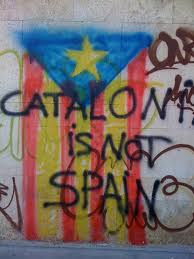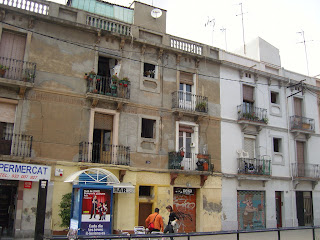I am studying Spanish at an NGO institute called EICA. EICA's aim is to help immigrants immerse into society. They offer Spanish courses to anybody, for free. Most of the people there are illegal immigrants who have sneaked into Spain and are on the way to legalising their stay here. In my class there are 5 African boys who are all 17 years old. Rachidu is from Bissau, Muhammad is from Ghana, Seidou is from Ghana, Khufulu is from Ghana and Rodrique is from Cameroon. The Ghanaians speak an African language. Rachidu does not speak a language which others can understand. Rodrique speaks French.
I was talking to the Ghanaians on Thursday after our Spanish lesson - which took us to a market, to practice buying food and asking prices etc. It was a useful and interesting lesson.
Khufulu and Seidou were the ones I spoke to. Kufulu has been here 6 months. Seidou has been here 2 months. They did not come together so they do not share the same experiences.
I begun the conversation by asking them why they are not in their countries, at high school. They told me their parents cannot afford to pay for them to go to school. Their parents are not in the higher class and do not have money. They do not go to school and are not looked after by their parents any longer. I was quite shocked. I know some Ghanaian people who are so well educated and who speak English with such eloquence. Then I asked how they came to Spain. They told me they came here by land and boat. They took buses, taxis or walked from Ghana to surrounding countries and finally made their way to Morocco. It was a harrowing journey which took months and exposed them to great danger. Nothing compared to the danger they faced when they would finally take the boat journey though.
They had to catch buses and walk between towns and cities in Africa. They would have to sneak across borders and wait until it was dark or safe to enter other countries without risks of being caught. It sounds very scary. They did not travel with passports as they were advised not to carry documents which would indicate where they were from. They said it was very hot and difficult getting across the desert to Morocco. It was also not a quick journey. The journey took several months as they would often have to stop in a town or city and work a while before they had money to move onwards to Morocco.
When they finally arrived in Morocco they had to earn the money to pay the boat master who would ferry them across the Mediterranean Sea to Spain. Spain is the preferred destination for so many immigrants because it grants permits to illegal immigrants after 3 years of being here. Once they finally had the money to pay for the boat trip they were able to complete the final leg of the journey. The aim being, to sail across the Med and land on Spanish shore. As soon as they were on Spanish shore they were safe and could begin to find their dream - to live a better life.

The boat trip was a frightening part. The boats leave from Moroccan shores. Many people were crammed into small boats. The boats depart for Spain but do not carry navigational equipment. The captains of the boats haphazardly guess where they are going. The crossing can take days. Captains do not know which way they need to go, to reach Spain. They see other ships and try to signal for help. Other ships will not allow them to get near. Other ships try to avoid the boats carrying illegals - perhaps for fear of being charged with assisting illegals or fear of being attached. One can never be sure if the boat is carrying poor refugees or a horde of pirates who will try to take control of the ship. So ships never help.
The journey can take a long time. There can be adverse weather conditions and rough seas. In the long hot Summer days, the passengers bake in the sun and many get so hot they dehydrate. Sometimes the boats get lost as they drift out into the Atlantic Ocean and are nowhere near Europe. People die from hunger and thirst. Sometimes passengers become so disillusioned that they jump off the boats and try to "swim" to land - in the hope that land is close by. Some of the people can barely swim so they do not know the dangers facing them - if they have to swim a long distance to reach the shore... People jump to their own peril.
 |
| Died swimming to shore |
Some boats are discovered by Spanish Coast Guards. Khufulu told me of his boat being found by helicopters who then sent a Coast Guard boat to arrest the passengers. Once they were on the Coast Guard boat, they were brought to Spain and then detained in a refugee camp for 2 months. Khufulu told me that if you want to stay you have to have the right "story". If the Spanish do not like your story you will be put on a boat and sent back to Africa - which is why they do not travel with passports. After his 2 month stay in the refugee camp he was allowed to stay. He was not sent back.
 |
| Spanish Coast Guard |
Seidou has a different story. He also made his way from Ghana to Morocco under difficult circumstances. But his boat journey from Morocco to Spain was effortless. He had no hiccups or getting lost at sea or being caught by the coast guard. He arrived on Spanish shores and then made his way up to Barcelona by begging, working and getting money any way he could.
Now that both boys are in Barcelona, I asked them if their lives are better. They both said No. They said that this is not the paradise they had thought they were coming to. They have many problems here. They have no place to sleep. They sleep on benches in parks or near the sea. (The police in Spain are very relaxed and do not bother to harass Africans. The Spanish seem to like Africans but dislike Arabs.) Tonight it is raining so I guess they are battling out in the rain. They cannot work as they do not have documentation which entitles them to work. They try to get any type of job they can - helping an older person to carry things or to clean a shop or wash dishes in a restaurant. Anything to make a couple of euros per day. They day I spoke to them, they had not made even one euro.
So why do they stay ? They told me that even though it is hard here, it at least offers them more than in Ghana. In Ghana they do not eat. Here they at least go to soup kitchens where they are fed 3 times a day.
In Ghana they do not even go to school. Here they come to school (they call EICA their school). They can learn Spanish but nothing else. But it is free for them. And most importantly, here they can earn something - even if very little. So it is certainly more advantageous being here than in Africa.
In the class most of us take notes during the lesson in order to remember and learn. I have watched the African boys. When they are asked to read a word or a text, they are hesitant because some of them cannot even read. The other day I was sitting next to Rachidu and I observed him writing. I think he is barely able to write. His eye-hand coordination was very poor. He wrote like a 6 year old and could not produce the letters correctly. I spelled a few words out to him and he did not know the alphabet. He kept asking me if the word was written correctly. After several attempts, I just said it was.
I was really taken back. I just assumed that everybody in the class could read and write but there was the proof, that even in 2011 there are still people who do not go to school, and cannot read or write. This was a very touching experience. These young African boys have travelled so far and with such difficulty to find a better life but they still face such hardships and yet they are happy and eager. They all come to lessons wearing a smile and participate enthusiastically. Rodriques especially. He is a clever kid and is very diligent. He tries so hard and is a cut above the rest.
So what does the future hold for these boys? They will have to wait for a family to "adopt" them. But some familes will simply adopt them on paper and not provide any means of support. They will be happy with even that. It is simply just a way to get the documents to stay legally. They are all trying to find somebody who will adopt them and then they will be entitled to permits which will enable them to go to school, to work and to improve their lives.
How complicated their lives are and they tackle their circumstances with such courage. My heart goes out to them as they face a cold rainy night outdoors.

















































